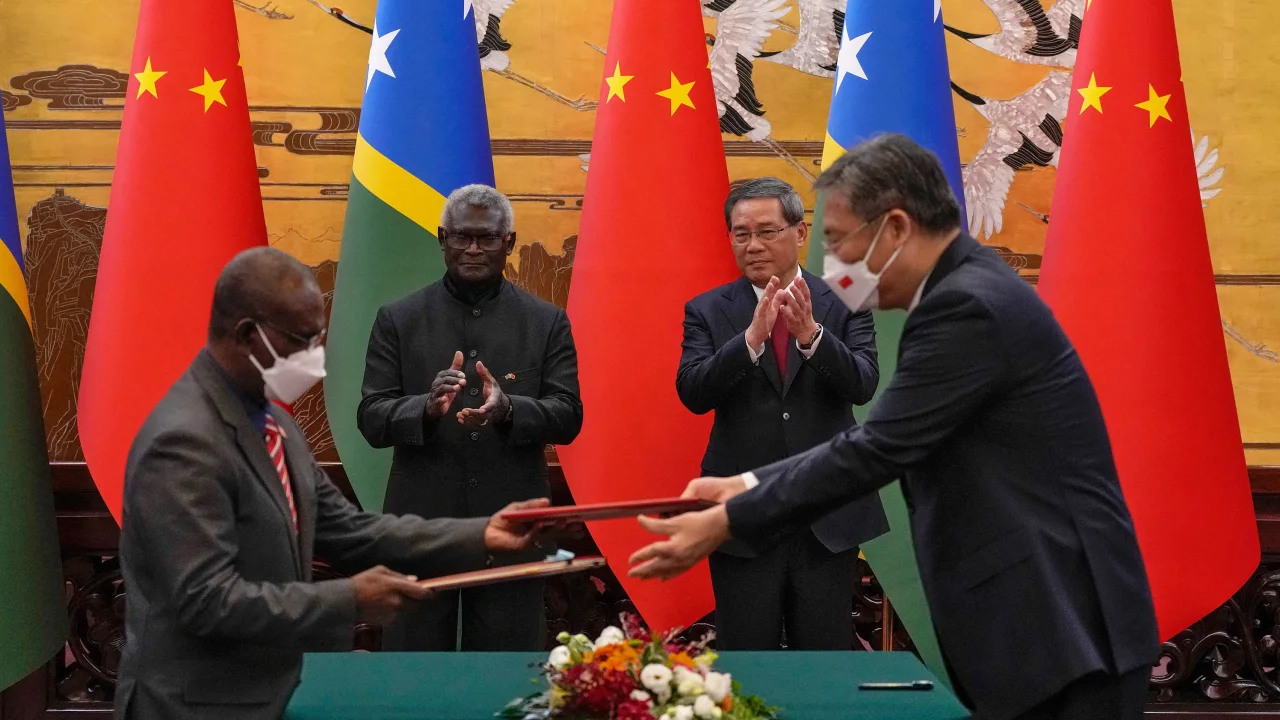Solomon Islands signs China policing deal in upgrade of ties

A deal on police cooperation was signed between China and the Solomon Islands on Monday, four years after the Pacific nation switched ties from Taiwan to China.
During a meeting with Chinese Premier Li Qiang in Beijing, Solomon Islands Prime Minister Manasseh Sogavare signed nine deals underlining the country’s new foreign policy.
To the alarm of the United States and neighbors, including Australia, Sogavare arrived in China on Sunday for his first visit since the two countries signed a security pact last year.
“The relationship between China and the Solomon Islands has developed rapidly in just four years, and it has now become very fruitful,” Li told Sogavare.
In turn, Sogavare expressed gratitude to China for its role in addressing global challenges, including peace and sustainable development. It is important for his country to learn from China’s experience, he said.
A spokesperson for the US National Security Council said Washington “respects the ability of nations to make sovereign decisions in the best interests of their people” and urged both sides to “release these texts as soon as possible so that transparency can be enhanced and discussions about the impacts of these agreements on regional security can be informed.” In 2019, Sogavare switched diplomatic ties from Taipei to Beijing when he came into power. He said the US was committed to strengthening longstanding bonds with the Solomon Islands and a strong relationship with the region. Taiwan is considered to be part of Beijing’s territory because it is democratically governed.
Sogavare called for a review of the 2017 security treaty with Australia, which has historically provided policing assistance to the Solomon Islands, including rapid deployments of police to quell riots in 2021, although China has increased its police training in the Solomon Islands.
Chinese state media outlet Xinhua announced that China will continue to provide assistance to the Solomon Islands to enhance its law enforcement capacity.
In a thinly veiled dig at Japan and AUKUS, the alliance of Australia, the United States, and Britain, the report urged “relevant countries” to handle nuclear-contaminated water releases into the sea and nuclear submarine cooperation “prudently.”
‘Trustworthy friends’
A comprehensive strategic partnership was also agreed upon between Sogavare and Chinese leader Xi Jinping on Monday afternoon, according to Chinese state television.
As developing countries, China and Pacific island nations should strengthen cooperation within the framework of South-South cooperation, Xi said.
In the context of South-South cooperation, China has long supported cooperation between developing nations as equals.
China-Solomon Islands relations, Xi said, have set a “good example of solidarity and cooperation” between developing countries and countries of different sizes.
Xi told Sogavare China supports more of its firms investing in the Solomon Islands and will continue to provide economic and technical assistance “without political strings attached.” According to Sogavare’s office, the country needs “quality infrastructure” to eradicate poverty through economic empowerment.
Chinese telecoms giant Huawei has already begun building a cellular network in the Solomon Islands, financed by a $66 million loan from the Chinese EXIM bank. As part of the project, a Chinese state company will also redevelop Honiara’s port.
China pledged support for a Blue Pacific Continent 2050 Strategy, a grand blueprint agreed upon among Pacific nations for advancing the region’s strategic goals.
A deal on “Sports Technical Assistance Project” was also struck as Honiara is hosting the Pacific Games in November. A stadium has been built by China.
In Beijing, Sogavare will open his country’s embassy until Saturday.
